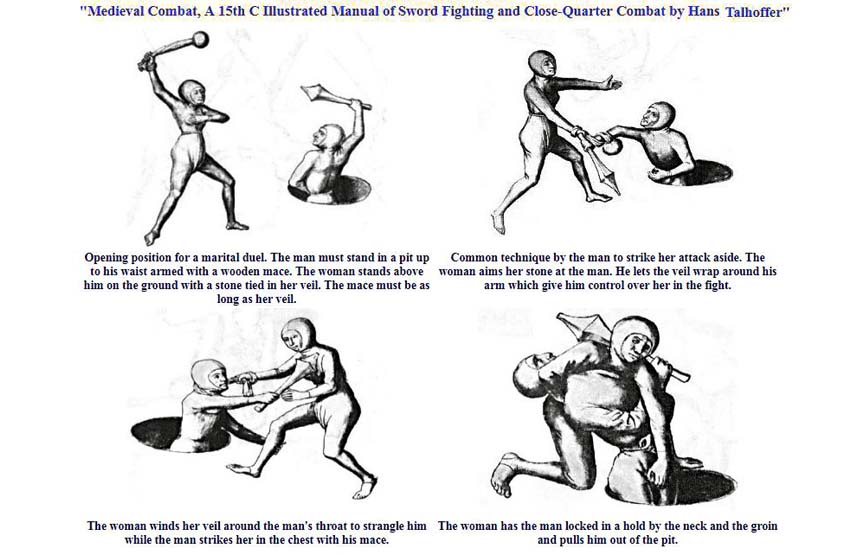|
The future is unwritten
Join Date: Oct 2002
Posts: 71,105
|
June 15th, 2019 : Marital Duel
In days of old
When knights were bold
And divorce courts weren’t invented
They put him in a hole
And her revealing clothes
Left all the voyeurs quite contented

Quote:
Trial by combat (or judicial duel, judicial combat) was a method of Germanic law to settle accusations in the absence of witnesses or a confession in which two parties in dispute fought in single combat; the winner of the fight was proclaimed to be right. In essence, it was a judicially sanctioned duel. It remained in use throughout the European Middle Ages, gradually disappearing in the course of the 16th century.
Unlike trial by ordeal in general, which is known to many cultures worldwide, the trial by combat is known primarily from the customs of the Germanic peoples. It was in use among the ancient Germanic tribes while it was unknown in Anglo-Saxon law. Neither it was known in Roman law and does not figure in the traditions of oriental antiquity such as the code of Hammurabi or the Torah.
Being rooted in Germanic tribal law, the various regional laws of the Frankish Empire (and the later Holy Roman Empire) prescribed different particulars, such as equipment and rules of judicial combat. One of the forms of judicial duel was so-called marital duels (or conjugal duels) in which a husband and a wife physically prove their case in domestic disputes. In an effort to even the field, husbands were ordered to fight while confined to a shallow pit with one arm tied to his body.
|

Quote:
|
As opposed to single combat challenges such as chivalric duels or later private duels of honor, in the Medieval Ages in some regions of Europe, mostly in German principalities disputing parties would be obliged by authority to enter into a judicial combat. Such occasions could be huge spectacles for the community. Participants might be typically given a month or two to prepare. Certain formalities and ritual – varying from place to place - dictated the setting and conditions. In fact, besides civic and felon cases, the judicial combat sometimes was used as a tool for solving domestic disputes between husband and wife.
|

Quote:
The marital combat rules required to wear special attire – different in different places. Usually, competing husband and wife were required to wear a tight-fitting body suit with a hood (perhaps a ritual or burial outfit), as it was depicted in the 15th century fighting manual written by Hans Talhoffer. Another form of attire for a female participant was a special long chemise with an extended sack-like closed sleeve (in which a stone was placed) was required as the only clothing for a wife fighting against her husband as it as it was depicted in the 14th century fighting manual written by Paulus Kal.
So, in some regions of medieval Europe (more truly in the Holy Roman Empire), a wife might be allowed to fight her husband, with rigorous conditions being imposed to make the duel a fair one. There are a few written testimonies about such combats. In the year 1200 a man and his wife fought under the sanction of the civic authorities at Bale, in Switzerland. In 1228, a woman fought her husband in Berne, Switzerland, and soundly defeated him.
German law provided that in such a case the man should be armed with three wooden clubs. He was to put be up to his waist in a three-foot wide hole dug in the ground, with one hand tied behind his back. The woman was to be armed with three rocks, each weighing between one and five pounds, and each one wrapped in cloth in form of a small sack. The man could not leave his hole but the woman was free to run around the edge of the pit. If the man touched the edge of the pit with either his hand or his arm, he had to surrender one of his clubs to the judges. If the woman hit him with a rock while he was doing so, she forfeited one of her stones.
|

Quote:
|
Bizarre as it may seem to us today, this marital duel was very far from play-acting. In the early Medieval Era, for both parties, the penalty for defeat could be death. If the woman won, the man was executed; if the man won, the woman was buried alive. Later, the terms seemed to be softened.
|
By the 17th century in New England things were much more civilized. If there was a marital dispute the woman was whipped.
To make sure she learned her lesson they waited a day or two for word to get around, the tied her wrists to a high wagon wheel
keeping her arms up high, stripped her to the waist, and flogged her back slowly.
Probably taking bets if her nipples would stand up.  link
link
__________________
The descent of man ~ Nixon, Friedman, Reagan, Trump.
|









